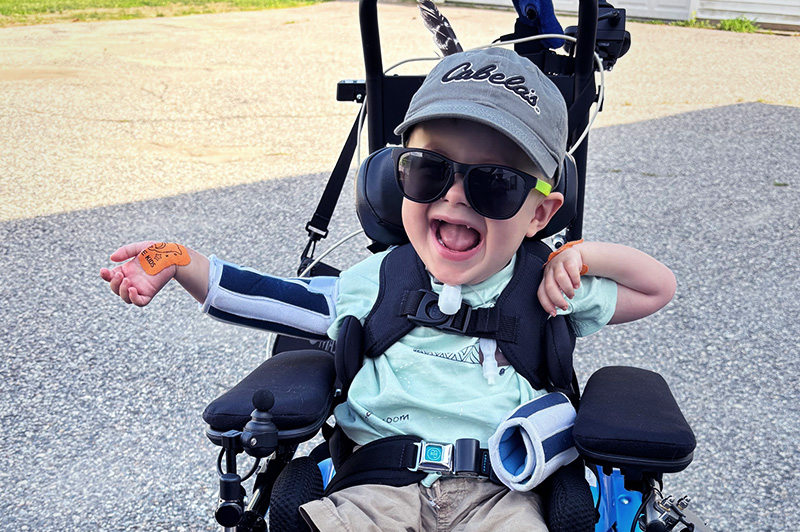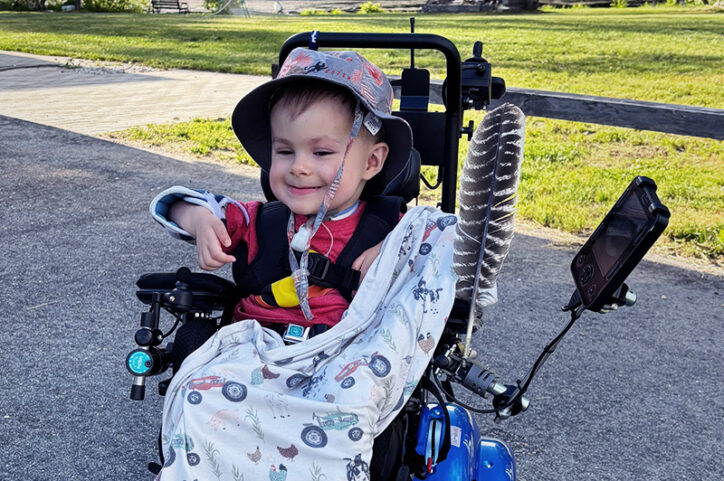After a severe case of myelitis, ‘rockstar’ Maxwell is on the move

When Maxwell Lazarz’s mother, Jennifer, tells him he’s a rockstar, he just laughs and asks her what that means. But as this joyful almost-3-year-old zips around in his motorized wheelchair, cracking jokes and blowing bubbles, it’s clear that his mom is right.
In fact, Maxwell has been defying expectations ever since he was diagnosed with a severe form of myelitis — inflammation of the spinal cord — when he was just 6 months old.
A frightening diagnosis
Maxwell was a typical baby until he suddenly got seriously sick. Earlier that day, he and his family had been celebrating Jennifer’s birthday — but within a few hours, he was vomiting, crying, and seemed weak. His parents brought him to their local emergency room in Maine.
There, his symptoms became even more frightening.
“He went from moving and starting to talk to unable to move or breathe on his own within in six hours,” remembers Jennifer.
Maxwell’s doctors diagnosed him with acute transverse myelitis, spinal cord inflammation that damages myelin, the protective covering of nerve fibers. In Maxwell’s case, this inflammation affected the myelin in his cervical spine, leaving him paralyzed from the neck down. Even as his doctors in Maine treated him with plasmapheresis and intravenous immunoglobulin therapy, they reached out to Boston Children’s Hospital for additional guidance and support in managing his care.

Getting the right care
The exact reason for Maxwell’s myelitis was unclear, but the reaction may have been triggered by a type of enterovirus, a class of viruses that commonly cause cold-like symptoms in young children. As a result, he needed to rely on a ventilator to breathe — and traveled to Franciscan Children’s in Massachusetts for comprehensive pulmonary rehabilitation.
Although myelitis is often temporary and many children recover well, Maxwell’s case was so severe that he needed ongoing support. He and his family connected with neurologist Dr. Leslie Benson, assistant director of Boston Children’s Neuroimmunology Center, who specializes in myelitis and related conditions.
“Dr. Benson has been the center of the hub for Maxwell’s care,” explains Jennifer. “She manages his care and tracks his progress.”
Also on his care team: Dr. Robert Graham from the Critical Care, Anesthesia Perioperative Extension (CAPE) and Home Ventilation Program — who oversees Maxwell’s long-term ventilator use — and pediatric physiatrist Dr. Rebecca Siegel. Together with the Neuroimmunology Center’s education specialist, Kitty Petty — and local occupational, physical, and speech therapists — they help ensure that Maxwell keeps moving forward to recovery.
“The best part about Boston Children’s is that nothing seems to be overlooked,” says Jennifer. “They proactively think about everything we need to do for Maxwell.”

Making incredible strides
Things haven’t always been easy. About eight months after returning home, Maxwell experienced a seizure that led to emergency hospitalization. More recently, he’s coped with respiratory viruses that can be trickier for a kid with his current health challenges.
But he’s made incredible strides, too.
Initially, Maxwell’s doctors in Maine worried that he would never be able to move or speak again. Today, he’s beginning to move his arms and legs and only relies on his ventilator when he sleeps. He has so much to say that he often wakes Jennifer up at night just to chat: “Dude will not stop talking,” she laughs.
And he isn’t just telling jokes or recounting his favorite episodes of “Mickey Mouse Clubhouse” — he’s also reciting his ABCs and showing off his vocabulary. This fall, he’ll start attending a nature-based preschool. In between baking with his grandmother, playing with his dogs, reading, and obsessing over trucks, he’s dancing in his wheelchair to his favorite song, “Lil Boo Thang.”
His care team predicts that Maxwell will continue to improve — and thrive — over time. His family agrees.
“He’s the spice of life,” says Jennifer. “And we think he’ll continue to surprise us.”
Learn more about the Neuroimmunology Center.
Related Posts :
-

The mystery of Jane’s left shoulder: Acute flaccid myelitis
When 5-year-old Jane Morehead tumbled off her bike in May 2017, it didn’t seem like a big deal. Jane’s ...
-

Acute flaccid myelitis (AFM): What parents need to know
If you’re a parent, chances are you’ve heard the recent news reports about acute flaccid myelitis, or AFM. ...
-

Bringing Xavien home: One family’s journey with bronchopulmonary dysplasia
Xavien Velazquez is getting ready to celebrate his first birthday. It’s a milestone for every child but especially meaningful ...
-

When even experts can’t figure you out: CNS-restricted HLH
At first it seemed like motion sickness when 5-year-old Emily threw up after spinning around outside, or during car rides. ...





